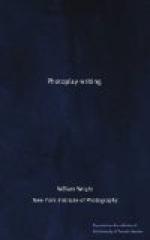6. The Use of Letters, News Items and Similar Inserts
The great thing in using inserts other than leaders is to be able to tell what would be most effective in scoring a point of the plot at an important place in the story. You may start to “write in” a letter and then suddenly get the idea that the same point might be better explained if a newspaper paragraph were used. But no matter what other kind of insert you employ, it will doubtless seem to be more a part of the action than will a plain leader. For this reason it is best, whenever possible, to use a letter, telegram, news item, or some similar insert, in place of a leader. A carefully worded letter introduced at just the right time will sometimes tell the audience as much concerning the complications of the plot as would five or six scenes.
Letters should be short and to the point, but they should also tell as much as possible of what can not be told in action. Better a single letter of thirty-five words which tells everything than two or three notes of a line or two each that only suggest what the writer means. Some of the so-called “letters” which are seen on the screen are simply ridiculous on account of their very brevity. If it is a mere note that is dashed off and sent to one of the characters, or a note left where it will be found by someone after the writer has gone away, its brevity is allowable; but when a “letter” is written by a man to an old friend of his—a friend who, he is told, is living in a distant city, when for years he has supposed him to be dead—and contains but seventeen words, it is likely to make the spectator doubt the strength of the former friendship.
It is not always necessary actually to write a long letter; but it is best in such instances to suggest that a long letter has been written. This may be accomplished in two ways: You may either show a paragraph in the body of the letter, with a line or two just before and just after it, thus:
On screen, letter.
and it was from him that I learned the truth.
I’ll leave for
Wheeling on the first train tomorrow, and
hope to clasp your hand
again before Monday night.
Honestly, old man, it seems too, etc.
or you may write out the ending of the letter in such a way as to suggest that much more has been said in the forepart of the message, thus:
On screen, letter, folded down to show only this:
so I’ll leave
for Wheeling on the first train tomorrow, and
hope to clasp your hand
again before Monday night.
Honestly, old man, it
seems too good to be true. I won’t be
able to believe that
what Morgan told me is true until I
see you with my own
eyes.
Until then, believe me to be
As ever, your sincere friend,
Stephen Loring.
To illustrate the way a letter will consume footage, we reproduce one for which fifteen feet were allowed.




